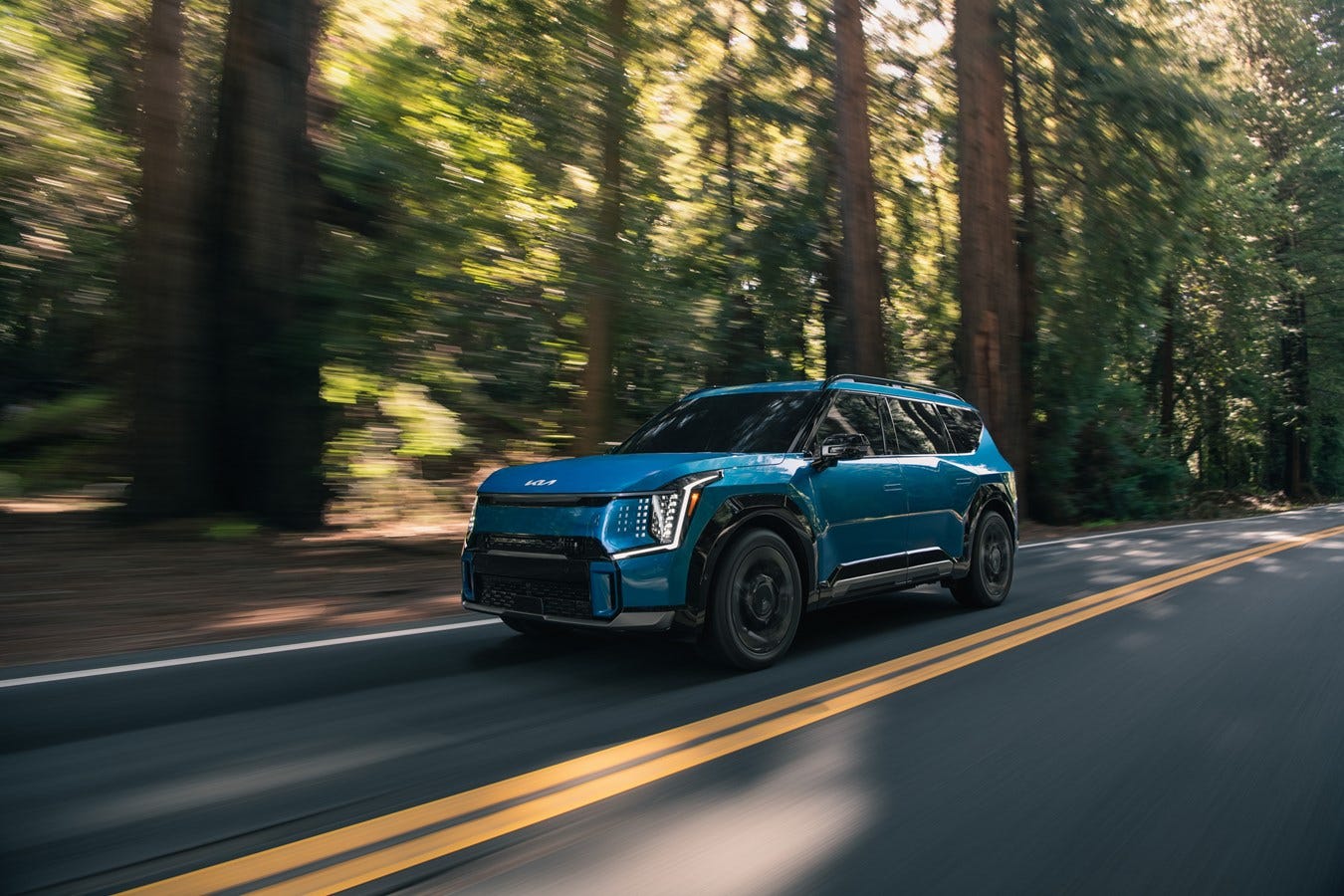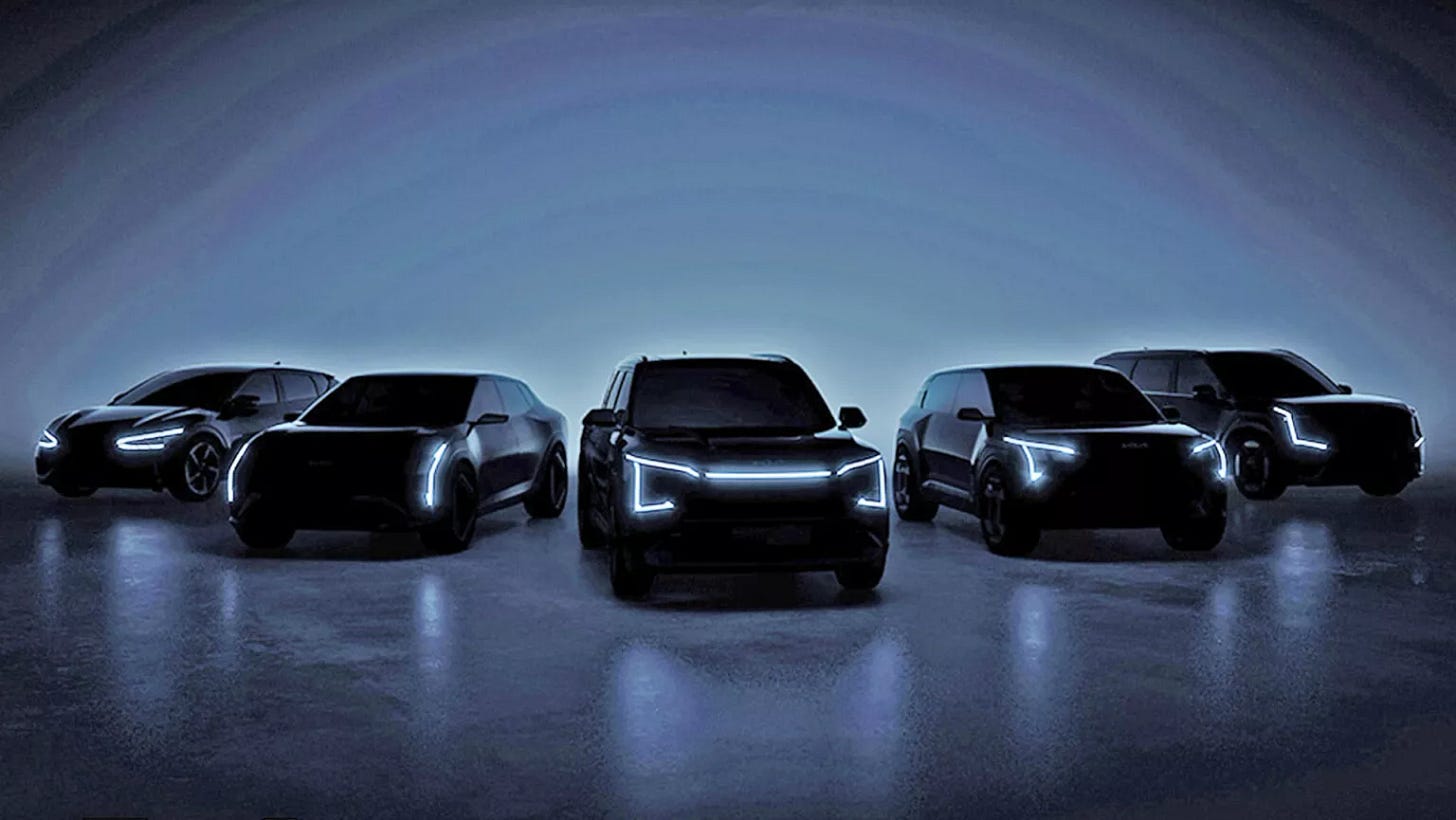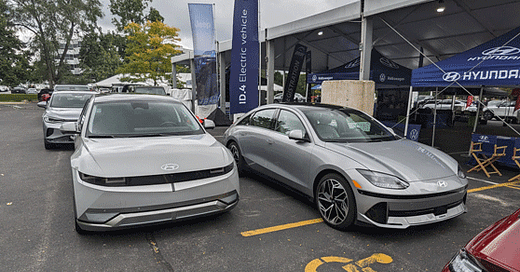Which EV Automaker Can You Trust in 2024?
Some automakers are "all-in" with EV technology, but many are waffling. So which car brands can you trust? Our recommendation for 2024 is the Hyundai Automotive Group.
Some legacy automakers are running away from electric vehicle (EV) development due to profitability in 2023. The recent news from Ford and GM around their EV development pause for trucks (GM) and battery development (Ford) is worrisome.
Sound familiar?
Zoom Out: Back in 2016, legacy automakers also turned away from EV development plans when regulations dissipated. If the automaker doesn't have concrete plans about making EVs profitable until 2026 or 2027, middle management could waffle and this trickles down. Going into 2024, which automaker is behind its EV products and at the dealer level?
Winner: The first recommendation in this three-part series (each post offers a new automaker) is the Hyundai Automotive Group, which includes Kia Motors. Again, this series will recommend automakers with a strong dealership service reputation and a well-built electric vehicle and battery pack technology. Like with any car, things go wrong, and having a solid support system is essential.
What are we looking at?
Brand and Dealership Support
Performance/Technology: Quiet driving, Torque, in-car software
Charging/Battery Warranties
And more

To lead off, Kia Motors just released its third-row Kia EV 9. The EV9 is a roomy, three-row SUV that carries over Kia’s style elements from its previous EVs but has its own unique look. The EV 9 is Kia’s third all-electric EV in six or so years.
Kia began taking reservations for the EV9 this fall, with deliveries coming in 2024. According to industry chatter, Kia has selected a ‘best-of-class” EV dealerships to receive the EV9 and keep it at the automakers’ preferred MSRP price.
Hyundai realized it had to move quickly with EV manufacturing. The South Korean automaker introduced the Electric-Global Modular Platform (e-GMP) over three years ago, which is a dedicated electric vehicle platform. Many legacy automakers used existing traditional gas car platforms and didn’t transition production and design exclusively to electric vehicles for some time.
Zoom In: Besides the Kia EV9, the auto group has produced Hyundai’s Ioniq 5, Ioniq 6, the 2024 Hyundai Tucson plug-in hybrid electric (PHEV), and the Kia EV 6.
Brand Support and Vision: So Kia and Hyundai are offering multiple model types and building manufacturing plants in the U.S. to take advantage of the $7,500 EV tax credit. A recent report has Hyundai production vehicles in Georgia in 2025 and qualifying for the $7,500 EV federal rebate.
Hyundai NA is building a $7.6 billion electric vehicle plant in Georgia and its partner for battery packs, LG Energy, is adding another $2 billion to the complex. The automaker hopes to produce electric vehicles by 2024 and qualify for the federal $7,500 EV tax credit. (*Currently, dealers can use the tax credit in leasing to EV shoppers and reduce the price of the vehicle). All signs point to a corporate culture and leadership from the top to transition and be profitable now.
Having Success Selling EVs: Even without the direct $7,500 tax credit, the Hyundai Group – which includes sporty Kia and Hyundai EVs – “sold or leased the second biggest number of electric vehicles in the U.S. in the first six months of 2023,” according to Hyundai’s President and COO, Jose Munoz. The company is only behind Tesla in 2023 in the U.S. Plus, Hyundai has a tight relationship with LG Chem and is using lower-cost battery materials – Lithium Iron Phosphate – which will help profitability. Other automakers using LFP battery materials are Tesla, Ford and GM recently announced its move to this chemistry.

EV Performance and styling: Kia and Hyundai owners are enamored with their EV and design – see discussion boards and social media groups. While there are stories about software challenges or issues with rear seat 120V outlets, the issues are minor.
Hyundai and Kia EVs are beloved by early adopters. There are numerous models, including the Kia EV6 crossover SUV, Ioniq 5 crossover, the Ioniq 6 sedan with styling reminiscent of Saab’s back end, and the three-row, Kia EV9 SUV. See image here, it can house an adult. (Ioniq 5 hidden functions).
Recent Comments by owners:
I drive my Ionic 5 like my 7-speed vette. (Now away until Spring.) Stop at yellow lights. Wait till green and bye. It's a rocket. Every time I try to show someone what it is like, I scare them and get yelled at. LOVE the Ionic 5.
Been charging to 80%; charged to 100% last night & woke up to this (345 miles). I'm very pleased with my new EV6 that I've owned since June 🥰
EV Fast Charging
In a 2023 study by CDK Global, the company shows that EV owners drive longer distances than regular internal combustion owners. Wejo, a data sevices company, “found that EV drivers have extended the distance of their journeys by an impressive 5.5% on average between 2021 and 2022.
Range anxiety is gone and fast-charging anxiety for non-Tesla owners is a real issue. While non-Tesla fast charging can be an issue, Hyundai and Kia EVs have large battery packs. Some new Hyundai and Kia EV trims have over 260+ miles, and the Hyundai Ioniq 6 long-range RWD has more than 350 miles of range.
When it comes to fast charging, Hyundai uses the CCS charging plug. But on Oct. 5, Hyundai announced it would adopt the North American Charging Standard (NACS/Tesla) for its Hyundai Models beginning in Q4 2024. They will have access to 12,000 Tesla superchargers.
Moreover, the company did announce a partnership with other automakers earlier this summer to create their own network:
(Via Sierra Club) Today, seven major automakers – BMW, GM, Honda, Hyundai, Kia, Mercedes-Benz, and Stellantis – announced collaboration on an electric vehicle fast charger network, powered by renewable energy, across the U.S. and Canada.
There are currently 32,000 publicly available fast chargers in the U.S. as of this month, and over 2 million EVs. This effort would nearly double the amount of fast chargers (adding at least 30,000).
Bottom line: You can buy a Hyundai or Kia vehicle and not worry about being brand stranded. The company is behind its EV products and dealerships should keep improving too.
Related: UK Bloomberg Green Rating







Thank you for reinforcing what I’ve been thinking. GM in particular has waffled on EVs for decades now. I can’t in good conscience put one of their models on my buy list.